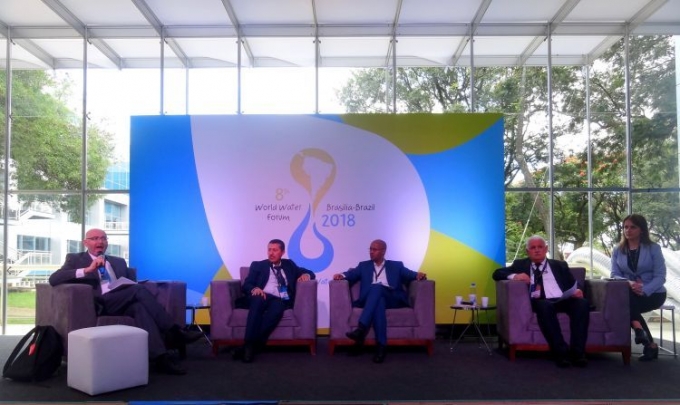"As a result of the occupation of 20% of Azerbaijani territory by the Armenian side, the ecological environment in the Nagorno-Karabakh Sarsang reservoir has been deteriorated sharply. The reservoir resources, which are under the control of Armenia, are used as a political threat. As a result, Azerbaijanis living in front-line areas, the majority of whom are refugees and IDPs, face the lack of water and can’t fully engage in agriculture." This was stated by the President of the International Eurasia Press Fund(IEPF) Umud Mirzayev during his speech at the 8th World Water Forum in Brazil.
He also noted that this reservoir was built to provide irrigation water to almost 96 thousand hectares in the surrounding areas.
So given this urgent humanitarian problem, the Parliamentary Assembly of the Council of Europe adopted a resolution on January 26, 2016 and requested “the immediate withdrawal of Armenian armed forces from the occupied territories and not using of water resources as a political tool.” But still, there is no any result.
Umud Mirzayev mentioned that in July 2010 the United Nations General Assembly adopted a resolution recognizing the human right to water supply and sanitation. Everyone should have access to sufficient, safe and affordable water for personal and domestic use.
"However, today the water deficit is used for political interests without taking into account international documents, international norms and standards that are aimed at maintaining peace, security and sustainable development."
The IEPF President said that the world community should be aware of this problem and ensure that every person in the world has the right to clean water.
The President of the IEPF called all the civil society representatives, refugees and IDPs to stand together, to unite the efforts and start collaboration to transfer a source of potential water crisis into an instrument of water for peace.
"Let's work together to achieve the liberation of the occupied territories by the militants, where there are reservoirs, rivers and other water sources vital for human being. We have to persuade the super powers to stop thinking only about the political interests and start thinking about the human lives, about the lives of millions of refugees and IDPs who have to leave their homes," Umud Mirzayev added.
The short-film which is produced by the IEPF and contains residents’ thoughts, as well as the opinion of the famous British journalist, writer, historian and political commentator Adel Darwish on water problems and the ecological catastrophe in the Sarsang reservoir in the frontline regions of Azerbaijan was demonstrated, too.
It should be mentioned that as a result of the occupation of Nagorno-Karabakh and seven surrounding regions of Azerbaijan, melioration and water management systems were destroyed and the economy, as well as ecological balance of the region was disrupted. Shutting off and inadequate use of water that flows from Sarsang water reservoir which was built during the Soviet times in the Nagorno-Karabakh region of Azerbaijan hinders people living in the frontline regions of Azerbaijan to irrigate their plants. This also means that almost 500 thousand people are forced to live without water.
IEPF, an international organization in general consultative status with the United Nations Economic and Social Council (ECOSOC) aims to draw world communities’ attention to the ongoing conflicts in the Caucasus, Middle East, Africa and their destructive results including causing water shortage and disrupting eco-system of the region. If it is not taken immediate action and measures against aggressors the environmental disasters will deepen the existing catastrophic situation.


